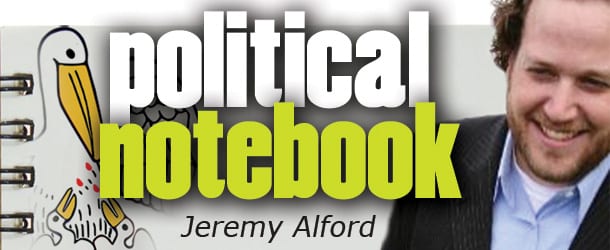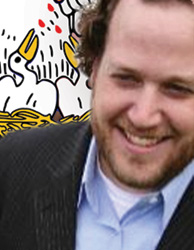By Jeremy Alford and Mitch Rabalais
In the wild world of Looziana politics, there has never been, and probably never will be, a character quite like Dudley Joseph LeBlanc, Sr., who the late Gov. Earl K. Long claimed could never be bought — only rented.
Vermilion Parish’s favorite son, or rather “cousin,” was known back home as “Coozan Dud.” But across the country in the 1940s and ‘50s, he was pop-culture famous for his supposedly magical medical elixir, Hadacol, which was promised to cure any and all ailments. Hadacol’s alcohol content, however, was the real selling point.
To say that LeBlanc was an expert promoter for his product would be an understatement. Writing about the wily Cajun in 1951, Time magazine called him “a stem-winding salesman who knows every razzle-dazzle switch in the pitchman’s trade.”
LeBlanc also had a political life. He served in both chambers of the Louisiana Legislature, was a member of the Public Service Commission and ran for governor three times. He was a funny and dynamic speaker — in both French and English — with a talent for holding an audience spellbound. If you wanted to run for statewide office in Louisiana in the middle of the 20th Century, you had to go through LeBlanc to buy into the Acadiana region.
It was during the 1960s that LeBlanc, then a state senator, decided to run again for his old seat on the PSC. While fundraising was not a problem, Coozan Dud desperately needed fresh endorsements and new support behind his campaign.
Hat in hand, he went to the Governor’s Mansion in Baton Rouge to ask then Gov. John McKeithen for an endorsement. “Big John,” however, found his hands politically tied in the race. Both LeBlanc and his opponent, incumbent Ernest Clements, had been major supporters of McKeithen. The governor didn’t want to take a chance on making an enemy out of either one.
LeBlanc, after being told that an endorsement was impossible, instead asked McKeithen for a favor. Could the governor arrange for him to have an audience with Pope Paul VI in Rome?
McKeithen tasked his top aide, Gus Weill, with the job of getting Coozan Dud a meeting with the pope. In his book, The Weill Side of Louisiana Politics, Weill recalls McKeithen telling him, “I can’t do it. I’m a Methodist.”
Flipping through the governor’s rolodex, Weill put in a call to cardinal John Cody in Chicago. The cardinal, who had previously been archbishop of New Orleans, was familiar with LeBlanc and his huge personality. Eager to help out Louisiana’s governor, Cody put in a request at the Vatican.
“The next thing we knew there was a press association photo of the Holy Father meeting with Sen. Dudley J. LeBlanc,” Weill wrote.
Whether or not Coozan Dud left behind any Hadacol in St. Peter’s Basilica remains a mystery.
Louisiana Freshman Captures Rare Gavel in Washington, D.C.
Congressman Mike Johnson of Shreveport might not be a name that’s in heavy circulation in local coffee houses and barrooms.
But the Republican is certainly a topic of conversation in Washington, D.C., these days, thanks to his election as the new chairman of the Republican Study Committee — a notable feat for a first-term legislator.
The RSC is Congress’ largest gathering of conservatives that strives to craft policy and shape debates. It was formerly chaired by U.S. House Majority Whip Steve Scalise of Jefferson Parish. So the position is known as a stepping stone to bigger things on the Hill.
Johnson recently agreed to an interview with LaPolitics about his new position and happenings in Washington.
LaPolitics: You’re someone who has a keen interest in the nuts and bolts of policy, going back to your days in the Legislature and even earlier than that. How does this interest in policy fit into your new role as chairman of the Republican Study Committee?
Johnson: Well, let me just tell you what I have said to all my colleagues over the last few months as I campaigned for this position. I said that I really feel like in the 116th Congress, which starts in January, I think RSC will arguably have the most important moments in its history: to provide a steady voice and what’s always been known as the intellectual firepower to defend and advance our core conservative principles. I think the American people need and deserve our clarity and our conviction and our consistency now more than ever. So my background in policy and law, in writing law and defending it in courts, advancing messaging for the conservative cause: I think all of that comes into play and will really come in handy in this position. Obviously, I think my colleagues recognized that, and that’s why we got elected to the position. It was a bit unusual, I think, for a freshman to run for chairman, but I guess my background really lent itself to this position. We’re looking forward to it.
LaPolitics: Some of your predecessors in this new position have included vice president Mike Pence, majority whip Steve Scalise, congressman Jim Jordan and former DHS secretary Tom Price. Have you heard from some of your predecessors, and, if so, what kind of advice and insight have they been offering?
Johnson: I sought that out, of course. Many of those former chairmen are close friends and confidants of mine already. Jim Jordan is a very close friend of mine in Congress, and, of course, Steve Scalise and I go back a quarter century. It’s good to have close friendships and advisors like that. I have already spent time with several of those guys, sort of grilling them on their thoughts and ideas. We’re entering unchartered waters in so many ways. It’s just a very unusual time in our national politics. You know, the culture is divided, our politics are divided and [are] increasingly divisive. Of course, we’re moving into the minority position, so it changes the role of what we do, and in some ways the strategy about what we do as Republicans in the Congress. So it’s good to bounce ideas and thoughts by people like that. We’re all working on the same goals and it’s good to have close allies who have done it before, so that I don’t have to re-invent the wheel on everything.
LaPolitics: Two big-ticket items for Louisiana, the flood insurance extension and the Farm Bill, are on the table before the 115th Congress wraps up business. Are you confident that both of these measures will get resolved before the term ends?
Johnson: I certainly am. Obviously, it’s critically important to Louisiana that we get both of those items accomplished. You know, with the Farm Bill, the conferees from the House and Senate are currently debating discrepancies between the House and Senate bills still.
I think it’s held up, on a couple of big provisions, primarily in the House bill. We added work requirements for SNAP benefits for able-bodied adults. We’re trying to repeal the Waters of the U.S. legislation from the Obama Administration era. One of the hang-ups right now is the forestry regulation and wildfire prevention, which is a big issue.
I think that the conferees will be able to work through those things and they’ll put together a final bill that meets all the criteria that all of us have demanded and fought for.
With the flood insurance program … we’ve been working on a long-term reauthorization and that’s desperately needed, because we have got to provide certainty for individuals who want to buy or sell or build a home or business. We filed in a bill in 2017, the SAFE Reauthorization Act, which would have given a long-term reauthorization of six years and protect policyholders from excessive rate hikes and the rest.
So [there are] some important provisions, there is a lot of dialogue, there is a lot of negotiations still going about the long-term fix. But I’m very confident that we will get a temporary reauthorization before Nov. 30 so nobody is left hanging on it.
(Writer’s Note: Both the House and the Senate voted to extend the National Flood Insurance Program.)
After Brief Flirtation, Treasurer Turns To Re-election
Treasurer John Schroder turned the heads of donors and journalists recently when he said he would be open to running for governor next year. But the Republican spoke more definitively on the issue recently. He will be seeking re-election in 2019 as treasurer.
Politically, it’s in keeping with other moves made lately by Schroder’s administration. For instance, roughly a month after her surprising third-place finish in the special election for secretary of state, Renée Fontenot-Free has joined the treasurer’s staff as executive counsel.
Free comes from attorney general Jeff Landry’s office, where she was previously director of the Public Protection Division. She has spent the vast majority of her career in state government, working under five different attorneys general and three secretaries of state.
Free’s new gig in the treasury likely means that she won’t be returning to the political arena as a candidate in 2019 — even after capturing 16 percent of the vote in a crowded nine-candidate field.
Like other statewide elected officials, Schroder will be up for re-election next year, having won a special election in 2017 to succeed U.S. Sen. John Kennedy. Schroder currently has $18,000 in his campaign kitty, but that’s likely to increase quickly as election season approaches.
They Said It: Twitter Edition
“I don’t think we should panic at all.”
— Economist Greg Albrecht, on falling oil prices, during the Revenue Estimating Conference meeting
“Hey, you were not supposed to leak the new state motto yet.”
— Fictional Twitter personality Gov. John Jel Jedwards, responding to Albrecht’s comment, via Twitter
“Twitter is run by Socialists.”
— Third District congressman Clay Higgins, R-Port Barre, on social media censorship, via Twitter
For more Louisiana political news, visit www.LaPolitics.com or follow Jeremy Alford on Twitter @LaPoliticsNow.














Comments are closed.